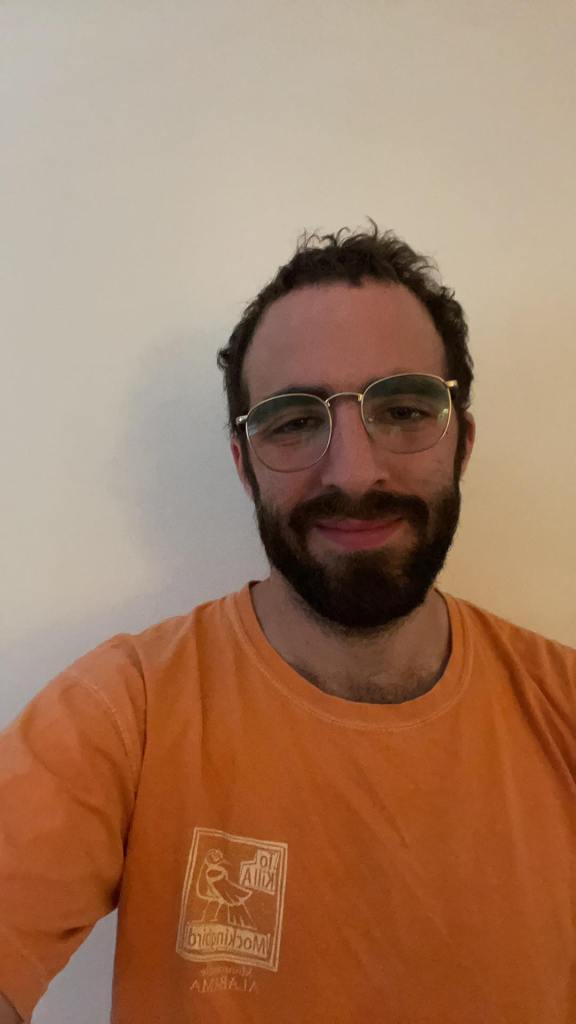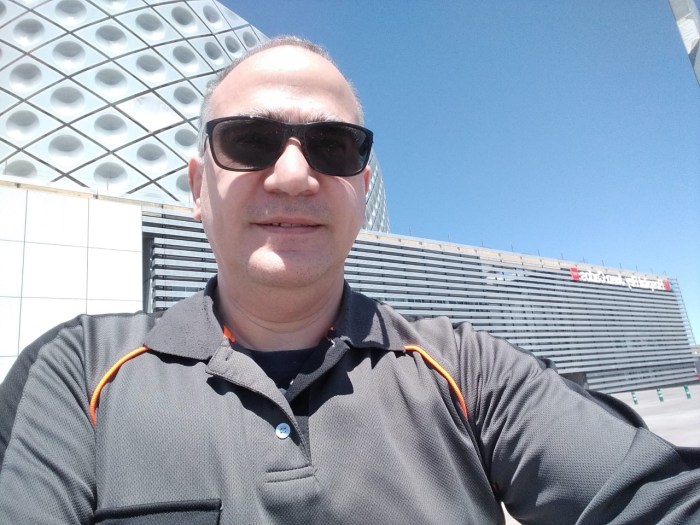Matt Valdespino is—along with his twin, Greg—one of my oldest and best friends. When I first met the two of them, I honestly could not tell them apart. I spent years mixing up their names. But as time went by, they diverged in fascinating ways.
The brothers share the admirabe ability to mix seriousness and humor—loving to laugh without trivializing the important things. But whereas Greg’s serious side was channeled into his passion for learning, Matt has always been pulled between art and activism. His urge to help others eventually won out, and culminated in his decision to become a professional therapist. This is his story:
ROY: What is your educational background? What did you study, where, and why?

MATT: I went to the University of Pennsylvania, in Philadelphia, and I studied Political Science, with a concentration in Political Theory. My minor was in Modern Middle East Studies. The reason? I guess I’ve always wondered this myself, since I’ve strayed so far from that, personally and professionally. But I guess the reason is that it was the Obama years, working in politics as a liberal progressive was a valued and exciting thing. It felt like being young and politically active was really in vogue, and also really useful. So I got really caught up in that. My older brother studied political science, too, and I look up to him as an example of what a good person does.
And we talked a lot about politics in my family growing up. I definitely loved the horse race elements of it—following legislation, following campaigns, who’s up, who’s down. It was like a game but it had stakes and a moral punch to it. And the Middle East stuff, it’s because it was the post 9/11 era, and I wanted to help people in the Middle East and Americans come together—you know, the whole idyllic, Obama-era, get everyone holding hands. That was the vision I had in my head.
R: After graduating, didn’t you work on a farm?
M: Yes, yeah, I did end up working on a farm. Because all of that political stuff—despite the idealism and the interest, the more I got into it the more I realized that I didn’t like politics as a process. And even policy was really complicated and hard for me to follow. It’s so intensely convoluted and everyone says it’s all wrong, anyway. I just couldn’t make heads or tails of it.
The only thing I really could understand and feel connected to was political theory—like Locke, Hobbes, Machiavelli. Like that vague stuff. The stuff that was really not about doing anything in politics, I loved that. And slowly I realized that that wasn’t what politics was going to look like. If I worked in politics, nobody was ever going to ask me what I thought about Leviathan. Nobody was going to give a shit about any of that. So I said, ok well then I don’t give a shit about you, and I’m going to farming.
R: Tell me about that experience.
M: So I graduated from college, and I really didn’t know what I wanted to do. I had been working in political internships that I thought was just selling snake-oil, selling “change” but just really fund-raising to keep our jobs. Or trying to scare-monger people to fight against the other scare-mongers. It felt fake to me. And I was reading political theory, which also felt fake, even though I liked it. So I thought, “Let me do something that’s undeniably real. Let me pick fruit for a year.”
So I ended up in Washington State. I did WWOOF (Worldwide Opportunities on Organic Farms), so they just put you on an organic farm. And you work for your room and board. And the owner of the farm also had a farm down in Chile, so they flew me down there for the spring harvest (or their fall).
R: After that I understand you got into stand-up. What attracted you to that?
M: I’ve always liked stand-up. I remember the day I got Comedy Central in my house. It was a ground-breaking moment in my life. Like, oh my God, a network that’s always funny! I just loved that. And I’ve always considered myself to be funny and enjoyed making people laugh. I feel comfortable doing that. But while I was farming, I was listening to all these podcasts, especially WTF with Marc Maron where he interviews comedians. And they were all so emotionally screwed up. But they had found a way of talking about it through comedy.
And also it was a way that I could talk about the big things, personally and globally, without being so condescending. I could just provide my impressions of them in a way that was sort of digestible to people. It was a way that I could talk about intense things without it being hard for people to understand. And without having the accountability of making a flawless argument. I could just say what I felt without backing it up with a full five paragraph essay.
R: Is five paragraphs a lot?
M: Yeah, in grad school we don’t write. Five paragraphs? I can’t even think of it!
R: So what do you think is the most challenging part of being a comedian?
M: The whole idea of stand-up is that you’re funny in your real life with friends, so just translate that to stage. So the problem is that, the reason you can be funny with your friends in real life is that they have all this context—of your relationship, shared experiences, and all of these conscious and unconscious parameters around who you are. And this allows you to subvert those expectations, or touch on these older identities, yadda yadda yadda. But in stand-up (unless you’re really famous) the audience doesn’t really know you. So then you need to take what you think is funny and translate it so a stranger thinks it’s funny. Then the challenge, for me, was finding an impression of me and my sense of self that other people can understand and connect with.
R: Meanwhile, you were working as a social worker. Is that right?
M: Yeah.
R: How did you get into that? And what did that entail?
M: So I moved to Washington, and I moved in with my uncle, who’s a therapist. And I love him. He’s really funny, really goofy. And we had all these conversations about what it means to be emotionally vulnerable and emotionally open. And he was telling me what it’s like to be a therapist. So I kind of got fascinated with the idea of just helping people. I think there’s a big part of me—going back to political science—that feels like I need to be helping people. That’s a moral obligation. But I lost that because politics became so vague, abstract, and argumentative. So my uncle showed me a way of helping people where it was direct. And it was kind of fascinating. You get to learn about people, find out who they are, explore them. I applied to a bunch of helping jobs—a nurse, a hospice worker—and the social worker is the one that got back to me.
I got a job as a social worker at a psychiatric center—so people with severe mental illness voluntarily come there. The umbrella term would be a “day center,” where people with mental illness come to spend the day, to help structure their lives.
R: You were doing this, and you were doing comedy. But at some point you decided to become a therapist.
M: Yeah.
R: What, exactly, are you studying now?
M: Clinical psychology. I still really don’t have a concentration, I’m just getting the lay of the land. It’s a Psy.D at Rutgers University. As opposed to a Ph.D, a Psy.D is really for practicing therapists, not researchers.
R: What made you make that decision, that you wanted to be a clinical psychologist?
M: It was a pretty gradual process. For one thing, stand-up is really hard. It’s a very exhausting pursuit. I fell less in love with it over time. It became harder and harder to enjoy it, to create new jokes, and to feel that I was getting better—which was pretty hard for me. I also felt that I was becoming phony, like a character or a persona. And instead of my stage presence becoming more like who I was off stage, the opposite happened. I got scared that it was infecting my whole life, that my life was becoming this kind of performance. It was creepy. Like I don’t know where stage ends and life stops.
And the social work stuff. A lot of it was great and moving. But a lot of it was really, really boring. There’s so much of social work that is just so monotonous. I was just spending the day with people. And a lot of it is just sitting at a computer typing with somebody. But there are moments when people get really, insanely honest with you—just wildly honest—and I liked those moments. That’s what I appreciated. And everything in comedy just felt so performative by comparison.
R: You’ve done some practice clinical work?
M: Yeah.
R: What do you think is the hardest part of being a therapist?
M: There are two things I find hardest. One hard part is just caring enough. I definitely struggle sometimes with, “Uh, ok, lemme just get through this session.” Thinking that somebody is making a problem bigger than it has to be… Basically, people aren’t always the most pleasant in therapy. They’re their absolute worst. And that’s good, they should be. But I can sometimes get annoyed with people.
And the other difficult thing is not jumping to conclusions. A therapist is like an emotional scientist, in that you’re always looking for more information. Your conclusion is the very last thing. Mainly you’re just trying to get more emotion out there, as much as possible in the moment. And that’s hard, because you want to be brilliant, you want to blow someone’s mind like “I got it! You yell at your boss because you hate your dad.” But I think there’s so much more value in just being curious.
R: Then what would you say is the most rewarding part of therapy.
M: Getting somebody to say something that they’ve never said before.
R: Can you elaborate?
M: Absolutely not.
R: What?!
M: Alright, I mean getting somebody to an emotional place that they have been afraid of, or were struggling with verbalizing, or didn’t even know was there. I think that’s the most rewarding thing for me. So they can experience and express a different part of themselves.
R: Is there anything you want to add?
M: Yeah, there is. Therapy is a very weird idea. It’s still relatively new, even though it’s becoming more accepted to go to therapy (and also more accessible). But I think people still go to therapists and don’t really know what they’re doing. And that can be fine. That can be totally fine. But I think one thing people should do when they go to a therapist is to be more comfortable asking the therapists what’s going on, asking for help with a certain thing, and telling the therapist “This is what I need.” I think people should feel more empowered to push back against therapists.
Because I think people get stuck in therapy, and it becomes this passive process that they’re not participating in, it’s just happening to them. But you can own the therapy process.




